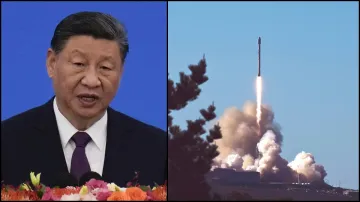Beijing: In a move expected to heighten international concerns over the country's nuclear arsenal, China on Wednesday said it successfully conducted a rare launch of an intercontinental ballistic missile into the Pacific Ocean. The ICBM, carrying a dummy warhead, was launched by the People's Liberation Army Rocket Force at 8:44 am (China time) and fell into "expected sea areas", said the Chinese defence ministry.
The Chinese ministry said it was "a routine arrangement in our annual training plan" and not directed at any country or target. According to a Xinhua report, China had informed the "countries concerned" in advance about the launch. The launch "effectively tested the performance of weapons and equipment and the training level of the troops, and achieved the expected goal", it said.
A Japan Coast Guard official said it had received a navigation warning from China on Monday for "space debris" in three zones in the South China Sea and the Pacific north of the Philippines' Luzon island, and in the South Pacific, on Wednesday. It is rare for China to fire long-range missiles into the sea as it prefers to test them unannounced in isolated provinces such as Inner Mongolia, analysts said.
Why China's launch would raise international concerns?
Beijing has for years stuck to a "no first use" nuclear weapons policy, but analysts note the PLA is catching up with major nuclear powers by fielding a nascent triad of weapons that can fired from land, sea and air. China, frequently criticised by the US for the opacity of its nuclear build-up, scrapped nuclear talks with Washington in July over US arms sales to Taiwan.
It is the first time in 44 years that China is known to have successfully conducted an atmospheric test of an ICBM over the high seas. In May 1980, a DF-5 -- China’s first ICBM -- flew more than 9,000 km (5,590 miles), as per reports. The new missile reportedly has the range required to reach the US mainland.
Meanwhile, the US and Philippine security officials have agreed to keep a US mid-range missile system in the northern Philippines indefinitely to boost deterrence despite China's expressions of alarm, two Philippine officials told the Associated Press on Wednesday. The US Army transported the Typhon missile system, a land-based weapon that can fire the Standard Missile-6 and the Tomahawk Land Attack Missile, to the northern Philippines as part of combat exercises in April with Philippine troops and to test its deployability aboard an Air Force aircraft.
China's nuclear arsenal
China has more than 500 operational nuclear warheads in its arsenal, of which approximately 350 are ICBMs, and will probably have over 1,000 warheads by 2030, the Pentagon estimated last year. China's military is constructing hundreds of silos for land-based ICBMs, the Pentagon said in the report. That compares to 1,770 and 1,710 operational warheads deployed by the US and Russia, respectively. The Pentagon said that by 2030, many of Beijing's weapons will likely be held at higher readiness levels.
China is currently engaged in bitter territorial disputes with the US, Japan, Taiwan, the Philippines and other countries in the South China Sea over various issues. Democratically governed Taiwan, which China claims as its own territory, has complained of increased Chinese military activities around the island in the past five years.
(with inputs from agencies)
ALSO READ | Jaishankar calls India-China relationship 'key to Asia's future', highlights challenges in border talks
ALSO READ | China and Russia concerned about growing India-US relationship, says top American diplomat
Latest World News
